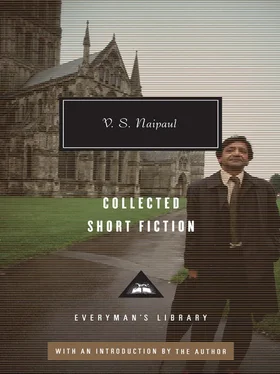In the dining-room the furniture-maker’s anger had seemed only theatrical, an aspect of his Mediterranean appearance, the moustache, the wavy hair. But now, in the open, with an expectant audience and a victim so nearly passive, he was working himself into a frenzy.
‘Pig! Pig!’
‘It’s not true,’ the tramp said, appealing to people who had only come to watch.
‘Pig!’
The grotesque moment came. The furniture-maker, so strongly built, so elegant in his square-shouldered jacket, lunged with his left hand at the old man’s head. The tramp swivelled his head, the way he did when he refused to acknowledge a stare. And he began to cry. The furniture-maker’s hand went wide and he stumbled forward against the rails into a spatter of spray. Putting his hands to his breast, feeling for pen and wallet and other things, he cried out, like a man aggrieved and desperate, ‘Hans! Hans!’
The tramp stooped; he stopped crying; his blue eyes popped. Hans had seized him by the polka-dotted scarf, twisting it, jerking it down. Kicking the rucksack hard, Hans at the same time flung the tramp forward by the knotted scarf. The tramp stumbled over Hans’s kicking foot. The strain went out of Hans’s smiling face and all that was left was the smile. The tramp could have recovered from his throw and stumble. But he preferred to fall and then to sit up. He was still holding the strap of his rucksack. He was crying again.
‘It’s not true. These remarks they’ve been making, it’s not true.’
The young Americans were looking over the rails.
‘Hans!’ the furniture-maker called.
The tramp stopped crying.
‘Ha-ans!’
The tramp didn’t look round. He got up with his rucksack and ran.
The story was that he had locked himself in one of the lavatories. But he reappeared among us, twice.
About an hour later he came into the smoking-room, without his rucksack, with no sign of distress on his face. He was already restored. He came in, in his abrupt way, not looking to right or left. Just a few steps brought him right into the small room and almost up against the legs of the furniture-maker, who was stretched out in an upholstered chair, exhausted, one hand over his half-closed eyes. After surprise, anger and contempt filled the tramp’s eyes. He started to swivel his head away.
‘Hans!’ the furniture-maker called, recovering from his astonishment, drawing back his legs, leaning forward. ‘Ha-ans!’
Swivelling his head, the tramp saw Hans rising with some playing cards in his hands. Terror came to the tramp’s eyes. The swivelling motion of his head spread to the rest of his body. He swung round on one heel, brought the other foot down hard, and bolted. Entry, advance, bandy-legged swivel and retreat had formed one unbroken movement.
‘Hans!’
It wasn’t a call to action. The furniture-maker was only underlining the joke. Hans, understanding, laughed and went back to his cards.
The tramp missed his lunch. He should have gone down immediately, to the first sitting, which had begun. Instead, he went into hiding, no doubt in one of the lavatories, and came out again only in time for the last sitting. It was the sitting the Lebanese and Hans had chosen. The tramp saw from the doorway.
‘Ha-ans!’
But the tramp was already swivelling.
Later he was to be seen with his rucksack, but without his hat, on the lower deck, among the refugees. Without him, and then without reference to him, the joke continued, in the bar, on the narrow deck, in the smoking-room. ‘Hans! Ha-ans!’ Towards the end Hans didn’t laugh or look up; when he heard his name he completed the joke by giving a whistle. The joke lived; but by night-fall the tramp was forgotten.
At dinner the Lebanese spoke again in their disinterested way about money. The man from Beirut said that, because of certain special circumstances in the Middle East that year, there was a fortune to be made from the well-judged exporting of Egyptian shoes; but not many people knew. The furniture-maker said the fact had been known to him for months. They postulated an investment, vied with each other in displaying knowledge of hidden, local costs, and calmly considered the staggering profits. But they weren’t really exciting one another any longer. The game was a game; each had taken the measure of the other. And they were both tired.
Something of the lassitude of the American schoolchildren had come over the other passengers on this last evening. The Americans themselves were beginning to thaw out. In the smoking-room, where the lights seemed dimmer, their voices were raised in friendly boy — girl squabbles; they did a lot more coming and going; especially active was a tall girl in a type of ballet-dancer’s costume, all black from neck to wrist to ankle. The German girl, our hostess of the previous evening, looked quite ill. The Spanish girls were flirting with nobody. The Egyptian, whose hangover had been compounded by seasickness, was playing bridge. Gamely from time to time he croaked out a witticism or a line of a song, but he got smiles rather than laughs. The furniture-maker and Hans were also playing cards. When a good card or a disappointing one was played the furniture-maker said in soft exclamation, expecting no response, ‘Hans, Hans.’ It was all that remained of the day’s joke.
The man from Beirut came in and watched. He stood beside Hans. Then he stood beside the furniture-maker and whispered to him in English, their secret language. ‘The guy’s locked himself in the cabin.’
Hans understood. He looked at the furniture-maker. But the furniture-maker was weary. He played his hand, then went out with the man from Beirut.
When he came back he said to Hans, ‘He says that he will set fire to the cabin if we try to enter. He says that he has a quantity of paper and a quantity of matches. I believe that he will do it.’
‘What do we do?’ the man from Beirut asked.
‘We will sleep here. Or in the dining-room.’
‘But those Greek stewards sleep in the dining-room. I saw them this morning.’
‘That proves that it is possible,’ the furniture-maker said.
Later, the evening over, I stopped outside the tramp’s cabin. At first I heard nothing. Then I heard paper being crumpled: the tramp’s warning. I wonder how long he stayed awake that night, listening for footsteps, waiting for the assault on the door and the entry of Hans.
In the morning he was back on the lower deck, among the refugees. He had his hat again; he had recovered it from the cabin.
Alexandria was a long shining line on the horizon: sand and the silver of oil-storage tanks. The sky clouded over; the green sea grew choppier. We entered the breakwater in cold rain and stormlight.
Long before the immigration officials came on board we queued to meet them. Germans detached themselves from Arabs, Hans from the Lebanese, the Lebanese from the Spanish girls. Now, as throughout the journey since his meeting with the tramp, the tall blond Yugoslav was a solitary. From the lower deck the refugees came up with their boxes and bundles, so that at last they were more than their emblematic black wrappings. They had the slack bodies and bad skins of people who ate too many carbohydrates. Their blotched faces were immobile, distant, but full of a fierce, foolish cunning. They were watching. As soon as the officials came aboard the refugees began to push and fight their way towards them. It was a factitious frenzy, the deference of the persecuted to authority.
The tramp came up with his hat and rucksack. There was no nervousness in his movements but his eyes were quick with fear. He took his place in the queue and pretended to frown at its length. He moved his feet up and down, now like a man made impatient by officials, now like someone only keeping out the cold. But he was of less interest than he thought. Hans, mountainous with his own rucksack, saw him and then didn’t see him. The Lebanese, shaved and rested after their night in the dining-room, didn’t see him. That passion was over.
Читать дальше









